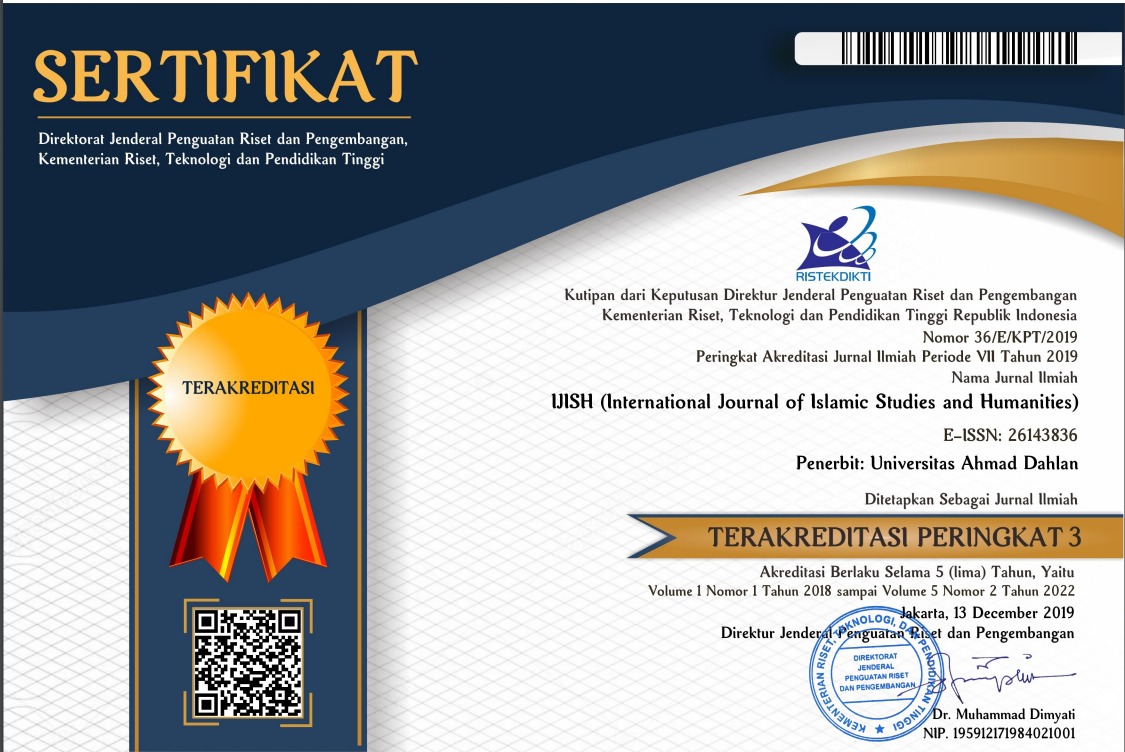The Islamic economic policy: some historical accounts on economic policies in the moslem world
DOI:
https://doi.org/10.26555/ijish.v6i2.9260Keywords:
Islamic economic policies, Umar bin Khattab, Umar II, Ghazan Khan, ‘Alauddin KhalijiAbstract
Throughout history, Islamic civilization has witnessed several important events in economic progress. One of the problems faced by Islamic leaders in fostering the people was related to improving people's welfare. In the classical period, some Muslim figures became pioneers in economic policies. In a specific way, the paper tries to analyze economic policies promoted by prominent Muslim figures such as 'Umar bin Khattab, Umar bin' Abdul Aziz, Ghazan Khan, and Alauddin Khalji. By using descriptive analysis, this brief article discusses the economic policies applied by some of the mentioned figures through historical analysis. The data were gathered from books and journals. Throughout critical historical analysis, the paper concluded that some Muslim figures succeeded in bringing Muslims into economic advancement along with some of the policies they came up with.
References
Afandi, M. Y. (2023). Analyzing the Impact of Digital Transformation in Islamic Philanthropy using Utaut Model. Jurnal AFKARUNA, 19(2), 317–337.
Alam, L., Sakarov, O. D., & Aminah, A. (2021). Economicharity, Piety and Inclusiveness in Cyberspace. International Journal of Islamic Studies and Humanities, 4(2), 22–32.
As-Suyuthi, I. (2010). Tarikh Al-Khulafa: Ensiklopedia Pemimpin Umat Islam dari Abu Bakar Hingga Mutawakkil. Hikmah.
Aziz, N., & Nurhasibah, S. H. (2020). Sistem Perpajakan dalam Perekonomian Islam: Kontribusi Abu Yusuf. Ar-Raniry Press.
Berger, I. E. (2006). Berger, I. E. (2006). The influence of religion on philanthropy in Canada. Voluntas, 17(2), 110–127. Voluntas, 17(2), 110–127.
Chamid, N. (2010). Jejak langkah sejarah pemikiran ekonomi Islam. Pustaka Pelajar.
Chapman, G. (2018). The Geopolitics of South Asia: From Early Empires to India, Pakistan and Bangladesh. Routledge. https://doi.org/10.4324/9781315185637
Elliot, H. M. (2021). The History of India: As told by its own Historians: Vol. II. BoD–Books on Demand.
Garner, J. M. (2015). A Critical Perspective on the Principles of Islamic Finance Focusing on Sharia Compliance and Arbitrage. Leeds Journal of Law and Criminology, 1(1), 69–90.
Hamka. (1961). Sedjarah Umat Islam. Nusantara.
Hewa, S., Friedman, L. J., & Mc Garvie, M. D. (2005). Charity, Philanthropy, and Civility in American History. In Canadian Journal of Sociology / Cahiers Canadiens de Sociologie, 30(1).
Husaini, S. A. Q. (1949). Arab Administration. Soldent & Co.
Imamuddin, S. M. (1969). A political history of Muslim Spain. Najmah.
Kallio, J., & Kouva, A. (2015). Street-level Bureaucrats’ and the General Public’s Deservingness Perceptions of Social Assistance Recipients in Finland, Journal of Social Policy anda Administration. Journal of Social Policy Anda Administration, 49(3), 316–334.
Karim, M. A. (2003). Sejarah Islam di India. Bunga Raflesia Production.
Karim, M. A. (2006). Islam di Asia Tengah: Sejarah Dinasti Mongol-Islam. Bagaskara.
Karim, M. A. (2012). Sejarah Pemikiran dan Peradaban Islam. Pustaka Book Publisher.
Lambton, A. K. S. (1988). Continuity and change in medieval Persia (Vol. 2). State University of New York Press.
Nelson, K. (2013). Social Assistance and EU Poverty Thresholds 1990–2008. Are European Welfare Systems Providing Just and Fair Protection AgainstLow Income? European Sociological Review, 9(2), 386–401. European Sociological Review, 9(2), 384–401.
Niazi, G. S. K. (1992). The life and works of Sultan Alauddin Khalji. Atlantic Publishers & Dist.
Piliyanti, I. (2018). Fintech Achieving Sustainable Development The Side Perspective of Crowdfunding Platform. Shirkah: Journal of Economics and Business, 3(2).
Riduwan, R., Ilyas, H., & Adha, M. A. (2023). Corporate Zakat in Perspective of Stakeholder Theory: A Case Study of Islamic Rural Banks. Afkaruna: Indonesian Interdisciplinary Journal of Islamic Studies, 19(1). https://doi.org/10.18196/afkaruna.v19i1.16329
Spuler, B. (1972). History of The Mongol, Based on Eastern and Western Accounts of The 13th-14th centuries, terj. Helga and Stuart Drummond. London: Routledge and kegan paul.
Sulaeman, S., & Ninglasari, S. Y. (2020). An Empirical Examination of Factors Influencing the Behavioral Intention to Use Zakat-Based Crowdfunding Platform Model for Countering the Adverse Impact of COVID-19 on MSMEs in Indonesia.” International Conference of Zakat, , 203–18. International Conference of Zakat, 185–203.
Wahyudi, R., Fithria, A., & Sartini, S. (2020). The relationship between capital structure and performance of Islamic banks. International Journal of Islamic Studies and Humanities, 3(2), 82–89.
Downloads
Published
How to Cite
Issue
Section
License
Copyright (c) 2023 Muhammad Abdul Karim

This work is licensed under a Creative Commons Attribution-ShareAlike 4.0 International License.
Authors who publish with IJISH (International Journal of Islamic Studies and Humanities) agree to the following terms:
- Authors retain copyright and grant the journal right of first publication with the work simultaneously licensed under a Creative Commons Attribution License (CC BY-SA 4.0) that allows others to share the work with an acknowledgment of the work's authorship and initial publication in this journal.Â
- Authors are able to enter into separate, additional contractual arrangements for the non-exclusive distribution of the journal's published version of the work (e.g., post it to an institutional repository or publish it in a book), with an acknowledgment of its initial publication in this journal.
- Authors are permitted and encouraged to post their work online (e.g., in institutional repositories or on their website) prior to and during the submission process, as it can lead to productive exchanges, as well as earlier and greater citation of published work.

This work is licensed under a Creative Commons Attribution-ShareAlike 4.0 International License.






